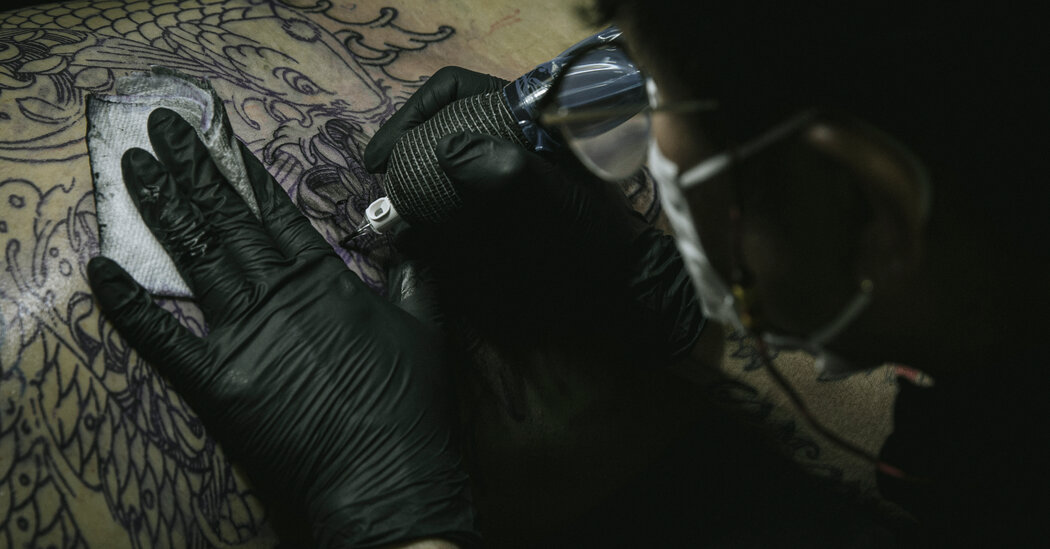
TOKYO — Ayaka Kizu, a web designer in Tokyo, stood by her office desk one recent day, peeling Band-Aids off an apple-size portion of her right arm. A meeting with clients had ended, so she was now free to reveal what lay underneath: a tattoo of a multicolored unicorn.
Ms. Kizu, 28, is one of a growing number of young people who are bucking Japan’s longstanding taboos against tattoos, which remain identified with organized crime even as the Japanese mob has faded and body art has become widely popular in the West.
Inspired by Japanese influencers and foreign celebrities, Ms. Kizu decided at 19 to get a tattoo of a crescent moon on her right thigh, a homage to her favorite manga series, Sugar Sugar Rune. She has since gotten five more.
As she has cycled through jobs since college, including public relations at a big traditional firm and sales work in a department store, she has had to get creative to conceal her tattoos, whose display remains essentially forbidden in all but the most liberal of workplaces. That means, for instance, that she must leave her hair down to cover the ink behind her ears.
“It’s a pain, but as long as I hide them when doing business, I don’t mind,” she said, adding: “I wanted to be fashionable. I just decided to go for it.”
With each scroll of their phones, young Japanese have become more exposed to tattoos worn by famous singers and models, chipping away at the stigma against body art and emboldening them to challenge entrenched social expectations about their appearance.
Around 1.4 million Japanese adults have tattoos, almost double the number from 2014, according to Yoshimi Yamamoto, a cultural anthropologist at Tsuru University who studies traditional “hajichi” tattoos worn on the hands of Okinawan women.
In 2020, tattooing took a huge leap toward broader acceptance when Japan’s Supreme Court ruled that it could be performed by people other than licensed medical professionals. Sixty percent of people in their 20s and younger believe that general rules regarding tattoos should be relaxed, according to a survey conducted last year by an information technology company.
In big cities like Tokyo and Osaka, visible tattoos are becoming more commonplace among food service workers, retail employees and those in the fashion industry. In the back alleys of Shinjuku, a buzzing Tokyo neighborhood, Takafumi Seto, 34, wears a T-shirt that shows off his red and black inked sleeve while he works as a barista at a trendy cafe.
Mr. Seto got most of his tattoos after moving to Tokyo 10 years ago from the suburbs of western Japan, where he still gets stares when he visits his family. His grandmother doesn’t know about his tattoos, so he sees her only in the winter, when he can wear long sleeves.
“I think that the hurdle to getting a tattoo has gone down,” he said. “On Instagram, people show off their ink. Tattoos are OK now. It’s that kind of generation.”
Hiroki Kakehashi, 44, a tattoo artist who has won a cult following among women in their 20s for his coin-size fine-line tattoos, said his clients now came from a broader range of professions: government workers, high school teachers, nurses.
“They’re often in places that can be hidden, but more people have tattoos than you would imagine,” Mr. Kakehashi said.
Tattoos have a long history in Japan, and they were important to women in Indigenous Okinawan and Ainu communities. Their association with organized crime goes back about 400 years. They were used to brand criminals on their arms or foreheads with marks that varied by region and crime: for instance, a circle, a large X or the Chinese character for dog.
After Japan ended more than two centuries of isolation in 1868, the country started promoting Western-style modernization policies. Among them: a law banning tattoos, which were seen as “barbaric.”
Although that ban was lifted in 1948, the stigma remained. Yakuza, or Japanese gangsters, often have neck-to-ankle “wabori,” a traditional Japanese-style tattoo done by hand using needles. Because of this gangster association, many hot springs resorts, beaches and gyms bar people with tattoos. Office jobs that allow tattoos are still sparse to nonexistent, with many companies expressly prohibiting applicants who have them.
Tattoos are also frowned upon as a violation of communal codes for how Japanese people should look — codes that can carry severe penalties for anyone who deviates from them.
Two subway drivers made headlines when they were given a negative evaluation after refusing to shave off their facial hair. A naturally brown-haired high school student in Osaka did too after she was punished for not dyeing her hair black. (When Ms. Kizu, the web designer, was in elementary school, her parents had to talk to her principal about her own naturally brown hair, saying that under no circumstances would she dye it black.)
But after protests by students, workers and school administrators, there have been some steps to loosen up.
In 2019, Coca-Cola Bottlers Japan announced that it would allow workers to wear jeans and sneakers in order to “encourage individuality.” Last month, the Tokyo government’s Board of Education announced that nearly 200 public schools would drop five rules on appearance, including requirements that students have black hair or wear certain types of undergarments.
The case that led to the breakthrough Supreme Court decision on tattooing began in 2015, when Taiki Masuda, 34, a tattoo artist in Osaka, had his home studio raided and was slapped with a fine. Instead of paying it — as many veteran tattoo artists who had agreements with the police advised him to do — he went to court.
The lawsuit, Mr. Masuda said, “changed the image of the tattoo industry in Japan.”
During the trial, a group of veteran tattoo artists, suppliers and lawyers came together to create the Japan Tattooist Organization. In consultation from two doctors, they created an online course on hygiene and safety. Tattoo artists can now receive certification to display in their studios, modeled after practices abroad. The organization is currently in talks with the health ministry, with hopes that the government will eventually recommend all tattoo artists take the course.
Last year, about 100 artists took the course. Currently, at least 3,000 are working in Japan, and with more legitimacy, there is hope that more societal acceptance will follow.
Some veteran tattoo artists advocate a gradual approach, worrying about some in the younger generation who ignore signs banning tattoos or take newly secured privileges for granted.
“We need to be extra well-mannered and follow the rules,” said one 50-year-old artist, who goes by the name Asami. “Although a good impression takes time to sink in, a bad impression is created in a second,” he added. Asami himself gained membership at his local gym only two years ago.
Among the new initiates into the world of the tattooed is Rion Sanada, 19, who one recent afternoon was lying nervously on a studio bed in the Setagaya ward of Tokyo, anxious to get her first tattoo.
Although she was about to start looking for full-time work, she said she was not worried about her job prospects.
“I’ll just get work where I can cover up my arms and legs in baggy clothes,” she said. “These days, tattoos are so much more commonplace.”
Three-quarters of an hour later, Ms. Sanada glanced down at her forearm, where an outline of a mouse, sprawled out on its stomach with little wings in the shape of hearts, now rested.
“I’ll work where I can until society catches up to me and I can be free,” she said.




